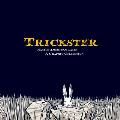
When looking for potential participants for the comics anthology
Trickster: Native American Tales: A Graphic Collection, not everyone I contacted supported my efforts.
The director of a Native American program at one university — who was not Native American — was especially blunt: "What makes you think you have the right to do such a project?" She followed with a stern warning that I risked professional suicide by doing the project because most Native Americans would likely publicly deplore the book.
She went on to tell me that I ought to contact Joseph Bruchac, a well-known Native American storyteller and author from New York State, who would likely tell me the trouble I would stir.
I thanked her for her opinion and told her that I knew Joseph — in fact, I illustrated the story that he and his son James contributed to the anthology. There was silence. And then, "Oh, you know Joseph? OK, that's great! Well, I guess you've been vetted. We have to be careful about who makes books regarding Native Americans."
Although I understood her concern, I found it rather patronizing that she felt obligated to act as a gatekeeper. I had contacted her to inquire whether she knew of any Native American storytellers who might want to participate in this project, but she'd decided it was her obligation to determine whether she would convey the solicitation.
The storytellers who participated in the book — and others, both Native Americans and non-Native Americans who helped me find the right authors — understood that these types of stories are global. Every culture has trickster-type tales. I'm of European descent, and to say that only Polish people could work on a project related to Polish fairy tales is silly and rather exclusive. If anything, opening and allowing people of other cultures to participate in a project helps open dialogue and appreciation of cultures and promotes global unity.
To make Trickster truly authentic, it was imperative that the stories be written by Native American storytellers. After all, they've told the stories probably hundreds of times and they could instruct the artists about certain aspects of the stories that were critical to understand and convey. But was it critical for me, the editor and coordinator of the project, to be Native American? No, not as long as I did the best job I could to capture the essence of the stories and that the storytellers were happy with the visual interpretation of their tales.
Most of the artists in Trickster are also not of Native American descent. I had hoped to include more Native American artists, but the logistics of the project made it difficult. There were fewer artists willing to participate in the project because of the time commitment involved to render the stories, and there was no upfront payment for the work; everyone, including myself, would receive payments when the book was published — once we found a publisher. It was also hard to find Native American artists who do sequential art — i.e., comics book — so there was a limited pool to tap.
Another issue was that several Native American artists who initially expressed interest had to drop out for various reasons. This wasn't an issue specific to Native Americans; as a rule of thumb, I've found that about one-quarter of participants &dmash; writers and artists — who agree to participate in a comics anthology will drop out (and that's OK and expected).
However, I found the ethnic mix of artists in a way strengthened the book. Again, it conveyed a broad partnership and appreciation of Native American cultures. It wasn't just a Native American book by Native Americans for Native Americans. It's a Native American book by Native Americans and non-Native Americans for everyone. I'm proud to be involved in a project with that approach.